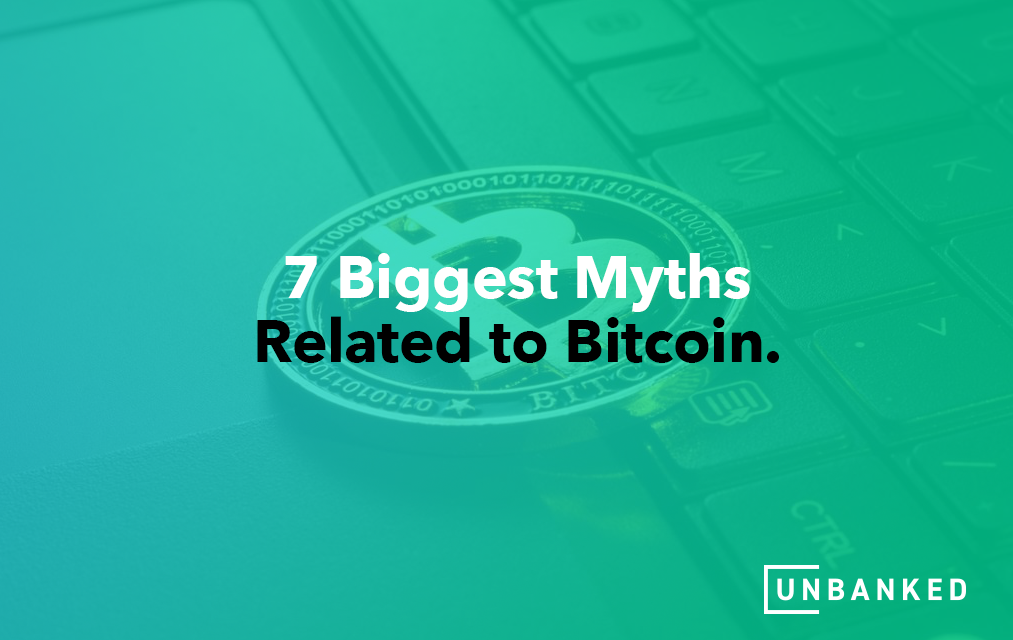Cryptocurrency continues to gain popularity and notoriety after its emergence, raising concerns about how it works and if it’s a legitimate alternative to traditional banking. Mass adoption of Bitcoin is growing, with over 46 million Americans currently owning the top digital currency, which is 22% of the population. Furthermore, the global blockchain market will reportedly grow by over $39 billion by 2025. It’s clear that a shift is taking place, and more people are educating themselves on the benefits of Bitcoin and its value. That being said, there are still 7 biggest myths related to Bitcoin that must be cleared out.
Since Bitcoin was officially minted and introduced in January 2009, there have been several myths surrounding how it works, the legitimacy of its setup, and its security. The following myth busters will show why Bitcoin has a valid purpose and encourage even greater adoption of the most valuable cryptocurrency globally.
Myth 1: Bitcoin Has No True Real-World Uses
One of the biggest myths regarding this coin and its functionality is that it isn’t useful in reality. And, if this coin does have use, critics argue that it’s being used for underhanded activities. This could not be further from the truth.
Like most legitimate digital currencies, this coin displays a history of affording people opportunities to make real payments to anyone worldwide. And these payments can be made without a payment processor or a traditional financial institution acting as a middleman. In many use cases, Bitcoin is utilized by institutional investors as a gold-like hedge to ward off inflation, being a major store of value. Several publicly-traded companies and major funds have bought millions or billions of dollars worth of Bitcoin to boost their asset management capabilities.
While Bitcoin is considered a precious rarity considering that only a maximum of 21 million can exist, it holds much financial value, with one Bitcoin costing over $40,000. Operating as a gold-like currency, it can be sent digitally or via email, making it less cumbersome than gold.
Myth 2: Bitcoin Lacks Security, is a Breeding Ground for Hackers
The critics also consistently voice their qualms about this coin’s security, not just about the cryptocurrency but about blockchain technology as a whole. They insist that Bitcoin is untrustworthy because it has been hacked multiple times. The truth is that Bitcoin cannot be hacked, especially as they constantly monitor their blockchain setup. Bitcoin is known for having highly secure open-source software that is consistently optimized by the developer community.
The reason for the criticism is that Bitcoin detractors mix up the issue of Bitcoin security with security issues surrounding crypto trading platforms. The trading platforms were hacked various times during the 2010s, including Mt. Gox in 2014, which triggered a big scandal within the crypto community.
While Bitcoin has never been hacked, it has been aware of software bugs including the Value Overflow Incident in 2010. And even then, the strength of Bitcoin’s developer community was shown as it took around eight and a half hours to correct the issue and deploy the fixed blockchain version.
Myth 3: It is Too Speculative
Another common misconception with Bitcoin is that it is very speculative and only operates within a bubble. As mentioned at the start, Bitcoin has become a highly adopted digital currency and contains a real value that people can earnestly capitalize on.
Bitcoin is not used for speculative purposes. Each day, Bitcoin settles around $10 billion worth of daily transactions or around 305,000 transactions. The tally is more than half of the daily transaction tally accumulated by Fedwire, the Federal Reserve’s central system to settle wire transfers made between financial entities. The transactions that Bitcoin settles daily include investment purchases such as remittances. Some countries like Nigeria use Bitcoin regularly for peer-to-peer transactions while others use the cryptocurrency to fund various anti-corruption initiatives.
Myth 4: It is Hard to Use
You can use your computer to make Bitcoin transactions via email
Bitcoin is based on a cryptographic key system that facilitates a peer-to-peer electronic cash setup. The technology can be complex for those who are unfamiliar with it. But, over time, Bitcoin users will realize that the technology driving the concept has more layers to it that make it easier to understand with experience.
Bitcoin includes various tools like intuitive digital wallets, plus mobile and web apps that direct people on how to use the cryptocurrency. Additionally, you can make Bitcoin transactions via email. You don’t need to manipulate complex concepts to use blockchain technology. It’s set up for people interested in investing in Bitcoin, and it only succeeds because it is easier to use than most think.
Myth 5: It Lacks Transparency
Bitcoin prides itself on transparency, contrasting the belief from its detractors that it’s too anonymous and its practices are illicit.
Since its inception, Bitcoin has operated as a public blockchain, and all transactions made can be ready by anyone. The anonymity comes for people who make transactions as long as they don’t disclose any addresses associated with the transaction.
The Bitcoin source code is free for anyone to use, guaranteeing the blockchain’s transparency to users while operational.
Myth 6: It Consistently Wastes Energy
Because Bitcoin miners utilize a lot of computer energy to secure the cryptocurrency’s network, there have been claims that Bitcoin uses processes with bad energy efficiency and thus adds to climate warming.
However, you might be surprised to know that around 40% of Bitcoin mining is powered by renewable, sustainable energy. Plus, Bitcoin uses energy for useful reasons as it secures trillions of dollars in value and serves tens of millions of people, requiring consistent energy usage. However, Bitcoin miners are gradually utilizing renewable geothermal energy or hydroelectric power.
Bitcoin is doing its utmost to reduce its carbon footprint during operations without sacrificing efficiency.
Myth 7: It Has Too Much Volatility to Be a Store of Value
While Bitcoin comes with its fair share of volatility, it has that volatility in common with other financial products like gold and government bonds. When gold was separated from the monetary system, its value was wildly volatile, increasing and decreasing significantly before flatlining for many years. That said, gold had its highest volatility at its highest value.
The most volatile assets can net the highest returns. Bitcoin is in the same price discovery stage that gold experienced during the 1970s when swings were common. But can be a huge store of value, though investors must exercise diligence when investing in the cryptocurrency, much like any other investment.
Want to know more about the benefits of Bitcoin and how to invest in the popular cryptocurrency? Check out our resources to learn more about it.





